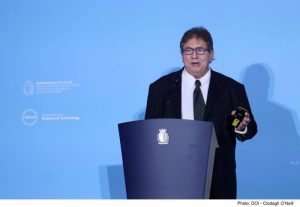Researchers from the Department of Communications and Computer Engineering, at the Faculty of ICT of the University of Malta and Ascent Software Ltd., have successfully reached a milestone in the ICT sector, with DEEP-FIR, a project which addressed the problem in improving the quality of facial images captured by CCTV cameras in combating forensic crime.
The project funded by FUSION, the National Research & Innovation Funding Programme, administered by the Malta Council for Science and Technology MCST, received around €185,000 in public funds. The results of the project were disseminated today during a public engagement event which took place at the Esplora Planetarium Hall, in Kalkara.
Parliamentary Secretary for Youth, Research and Innovation Keith Azzopardi Tanti addressed the stakeholders and public during the event stating the importance of using new technologies such as Artificial Intelligence for the benefit of the public.
“Each year Malta is increasing its contribution towards research and innovation. Today, we are already seeing the results of how R&I can help several sectors in our country to grow and expand their operation. The DEEP-FIR project focuses on the safety of our citizens. It is needless to say that safety is one of the main concerns people have. This project will help to resolve crimes but also prevent them from happening.”
Azzopardi Tanti thanked the local researchers involved in this project with the hope that the local citizens will be able to make use of it in the near future.
MCST’s Chairman, Dr Tonio Portughese also spoke during the event, saying that: “The Malta Council for Science and Technology, will strive to maintain and increase its important role, exploring incentives and measures in the areas of Research and Innovation, such as the DEEP-FIR project, supporting them, and providing the platform whereby other partnerships are formed.”

He added that MCST has become acknowledged, recognised, and appreciated as the catalyst that, through funding and through active involvement, is daily bringing together our higher educational and research institutions with the private sector, sharing and complementing each other in order to attain the goals that they aim at.
Prof. John Abela, Principal investigator on the project said “Image super-resolution elevates the quality of our visual data, enabling greater detail and accuracy for critical areas like medical diagnostics, surveillance, digital forensics, and scientific research. It is our bridge between the limitation of our technologies and the vast potential of high-resolution vision, fostering clearer insights and informed decision-making.”

Over the last seven years, MCST has administered some €20 million in funding for driving forward innovative projects such as Deep-FIR through the FUSION national funding programme. Each project benefiting from the FUSION funding programmes spreads over a period of three years and can receive up to €295,000 to fund their research.










